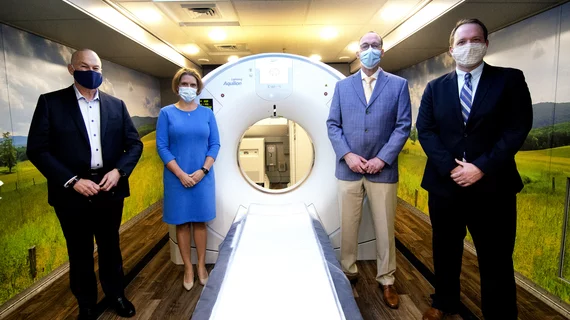Hospital system launches nation’s first fully mobile low-dose CT lung cancer screening program
The West Virginia University Health System has launched what leaders believe to be the nation’s first fully mobile low-dose CT lung cancer screening program.
LUCAS, as they’re calling it for short, will target rural areas of the Mountain State, equipped with an artificial intelligence-powered computed tomography scanner. The machine is continuously powered via the vehicle, which WVU said will enable broader access to care, higher throughput and shorter wait times.
Albert Wright Jr., president and CEO of the 16-hospital system, noted that many West Virginians do not have local access to LDCT, with few facilities registered to provide screening services.
“If there’s one thing we’ve learned through the hub-and-spoke model we’ve adopted for our health system, it’s that we need to meet people where they are rather than have them travel to us for their care,” Wright said in a statement. “Our Mobile Cancer Screening Program is an extension of that model, and we believe LUCAS will fill the gap in lung cancer screening in the state.”
LUCAS will visit 42 counties that lack access to such services, seeing 20 patients per day, due to COVID-19 protocols. WVU said this effort builds on previous success with Bonnie’s Bus, a mobile imaging unit that’s delivered 23,000 screening mammograms and detected 110 cancer cases since 2009. A 2019 study found that lung disease accounts for 18% of new cancer cases in West Virginia, more than 2,000 annual diagnoses and nearly 1,500 deaths. Half of diagnosed patients have cancer that has spread beyond the lungs, and the disease kills more West Virginians than colorectal, prostate and breast cancer combined. Insurance coverage remains a barrier to LDCT for some, but WVU said it will never turn patients away, noting that grant funds and donations are available to pay for screening.
The health system is collaborating with Canon Medical Systems USA and the Lung Cancer Initiative at Johnson & Johnson to create the program. Those involved hope the pilot can increase awareness and serve as a nationwide screening model.

